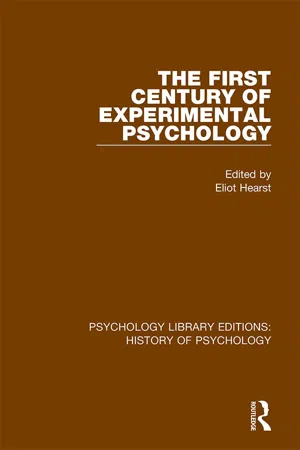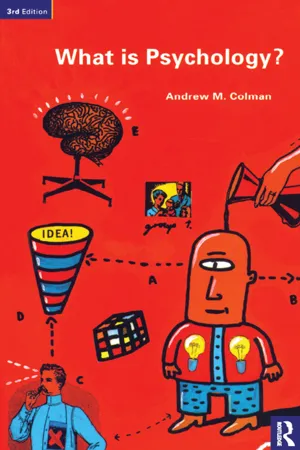Psychology
Emergence of Psychology as a Science
The emergence of psychology as a science refers to the historical development of psychology from a philosophical and speculative discipline to a more empirical and scientific one. This transition was marked by the adoption of scientific methods, such as experimentation and observation, to study human behavior and mental processes. Key figures in this emergence include Wilhelm Wundt, who established the first psychology laboratory in 1879.
Written by Perlego with AI-assistance
6 Key excerpts on "Emergence of Psychology as a Science"
Learn about this page
Index pages curate the most relevant extracts from our library of academic textbooks. They’ve been created using an in-house natural language model (NLM), each adding context and meaning to key research topics.
- eBook - ePub
- Elliot Hearst, Eliot Hearst(Authors)
- 2019(Publication Date)
- Routledge(Publisher)
The new sciences and philosophies that emerged in the eighteenth and nineteenth centuries were accompanied by a variety of psychologies. They revealed the profundity of their authors as they struggled to grasp the implications of the new knowledge and theories. It became increasingly necessary to understand the nature of the mind that could originate and comprehend scientific revelations. Naturally, there was no one solution, for there was no one problem and no single need. For example, consider the separation of the physical and spiritual domains that Galileo and Descartes effected. If that distinction is granted for the sake of argument, one must now explain how the mind, being or residing in one of those domains, can come to understand and deal with the other. How is that done? Again, by what means does the physical world exert its effects on the mind? Descartes had proposed that the pineal gland was the place where that influence occurred, but that silly notion was quickly rejected. Well, how should a mind that can influence the action of material things be conceived? That became a prime question. Answers were plentiful. They were to be found in the psychologies—really philosophies of mind—that sorted themselves out along many lines. National traditions developed so that English-, Scottish-, French-, and Germanic-language psychologies could be discerned. The most interesting psychologies generally emphasized one or the other side of a number of polarities: description vs. explanation; rationalism vs. empiricism; innate ideas vs. experience; faculties vs. powers; ego vs. association; ideation vs. sensation; animal nature vs. human personality; and, of course, idealism vs. materialism. Though all the psychologies were identified with some sort of general philosophy or theology, it is clear today that a new discipline was being formed. I have already contrasted the national differences that made Germany rather than France or England the country where psychology first emerged as an academic and scientific discipline. I shall now sketch some more factors leading to the particular character that psychology developed as an experimental science.To begin with, some aspects of the philosophy and theology in which most psychology was embedded until quite recent times will be discussed. I then consider the sciences whose tremendous expansion and success served as a source of tension and inspiration for philosophers and from which psychology emerged as an independent discipline—medicine and psychiatry, biology and physiology, and mathematics and physics. My review deals only very briefly with substantive developments in these various sciences; later chapters—for example, Chapter 4 , Comparative Psychology and Ethology, by Gottlieb; Chapter 10 , Physiological Psychology, by Thompson and Robinson—deal with developments in related sciences in greater detail. The following books will give the reader a deeper appreciation of many of the ideas and events taken up or only referred to in this chapter, especially the British empiricists and associationists: Hoffding, 1895–1896; Merz, 1896–1914; Murphy and Kovach, 1972; Robinson, 1976; Warren, 1921.V. PSYCHOLOGY BECOMES A DISCIPLINE
In eighteenth-century France and Britain psychological thinking as part of philosophical analysis was more original and deeper than in the German states. On the other hand, drawing heavily on French and British ideas, it was the German philosophers and pedagogues who first wrote systematic texts in psychology. By including the term “psychology” in titles—for example, C. Wolff’s Rational Psychology or Empirical Psychology in the 1730s—they gave a concrete identity and label to a nascent discipline. It should not be surprising, therefore, to learn that the first modern history of psychology was written as part of that Germanic tradition: the collected works of Friedrich Carus (1770–1807) included Psychology as Volumes I and II, Volume III as the History of Psychology, and Reflections on the History of Psychology - Nancy Fenton, Jessica Flitter(Authors)
- 2015(Publication Date)
- Research & Education Association(Publisher)
Chapter 3 History and ApproachesPsychology is the scientific study of the behavior and mental processes of humans and animals. Behavior is defined as any action that may be observed and measured, and mental processes include cognitions, sensations, perceptions, and emotions. As a science, psychology seeks to use empirical methods to observe, measure, predict, explain, and positively influence behavior. Some psychologists focus on the biology of behavior and mental processes, such as the influences of nerve cells, genetics, or hormones. Other psychologists study complex social behaviors, such as aggression, attraction, and prejudice. There are many varied approaches to the study of psychology, making it a rich and complex field.Early Influences on PsychologySince the beginning of thought, humans have asked psychological questions, such as: How do we experience the world around us? What is the relationship between the way that we experience the world and how our bodies function; for example, why does food lose its flavor when we are sick? How do we learn, and what accounts for differences in behavior and temperament among people?Greek PhilosophyThe science of psychology, like physics, chemistry, and biology, developed from philosophy. Historians trace psychology’s beginnings to the philosophers of ancient Greece. Ancient Greek philosophers observed and interpreted their environment and organized their findings, forming the basis for empirical investigation in psychology. These philosophers were the first Europeans to reason that human beings have, in addition to a physical body, an apparatus used for thinking. Philosophers called this thinking apparatus the psyche or mind . The term psychology means literally “the study of the mind” and results from the combination of the Greek root words psyche or “mind” and logos, meaning “the study of.” Ancient Greek philosophers were the first to debate whether the mind could exist separately from the body in what is referred to as themind–body problem.In what is known as dualism , Socrates and his student Plato both believed that the body and the mind were separate and that only the mind survived after death. However, Aristotle suggested that the mind could not be separated from the body because mind and body were different aspects of the same thing; this is known as monism . Greek philosophers also questioned whether thought and behavior were innate or learned through experiences in what is known today as the nature versus nurture debate .- eBook - ePub
Knowledge
The Philosophical Quest in History
- Steve Fuller(Author)
- 2015(Publication Date)
- Routledge(Publisher)
3 Epistemology as psychology of scienceIn the beginning the psychologist was the self-conscious scientist
Experimental psychology began as the psychology of the scientist, specifically the pivotal role that intersubjective differences in astronomical observation – the so-called personal equation – played in laying the foundations of psychophysics in the mid-nineteenth century (Boring 1950: 31). It was assumed that science’s special epistemic powers resulted from scientists’ heightened self-consciousness about human cognition in general. This assumption was taken in two different directions in the early twentieth century. The first, championed by John Dewey (1910), amounted to advising teachers that children should be exposed to the “scientific method” (i.e. hypothesis testing) in order to learn how to think. The second, relevant to the subsequent development of psychology as a discipline, was that scientists may be expected to be more articulate about what non-scientists always already do whenever they think. This view, shared by the physicists Max Planck and Albert Einstein, justified the Würzburg School’s controversial application of the introspective method to themselves and each other, very often using complex philosophical problems as stimuli (Kusch 1999). Here it is worth recalling psychology’s dual institutional origins as the applied wing of the philosophy faculty and the theoretical wing of the medical faculty, which helps to explain the pivotal role of William James, someone trained in medicine who migrated to philosophy where he established a psychology laboratory (Ben-David and Collins 1966; Bordogna 2008).These early Würzburger steps in what is now called “cognitive psychology” were followed up in the 1920s and 1930s by the Gestalt psychologists Otto Selz and Karl Duncker, who departed from their Würzburg forebears in clearly separating the experimenter and subject roles. (As we shall see in the next chapter, Karl Popper was a fellow-traveller who was distinctive in returning to philosophy.) They studied scientists’ notebooks to construct general testable accounts of problem-solving (Petersen 1984; Wettersten 1985). Moreover, the Gestalt thought leader Max Wertheimer (1945) probed the directive nature of Einstein’s own discovery process in a quarter-century correspondence with the revolutionary physicist. This work in turn inspired the field of “protocol analysis” and other techniques to infer thought processes from verbal behaviour that are still used by a wide range of psychologists today (Ericsson and Simon 1985). - eBook - ePub
Psychology in Historical Context
Theories and Debates
- Richard Gross(Author)
- 2017(Publication Date)
- Routledge(Publisher)
These approaches (such as Structuralism, Behaviourism, and Cognitive Psychology) differ not only in terms of what they consider the appropriate subject-matter to be, but also in terms of the methods used (or advocated) for studying this subject-matter. This relates to the debate regarding the nature of science (in general) and the validity and appropriateness of using certain methods to investigate human beings/people (in particular).The implication of the preceding paragraphs is that, regardless of how we view Psychology’s history, and regardless of how its subject-matter is defined, Psychology adopts a scientific approach. This, in turn, begs two major questions: (1) What do we mean by science? And (2) what kind of science is/should Psychology be? These questions relate to epistemology and methodology: the nature of the knowledge we are trying to acquire and the methods used to acquire it. These are discussed in the remainder of this chapter.Psychology’s histories
The contribution of Wilhelm Wundt: founding father or origin myth?
BOX 1.1
KEY FIGURE: Wilhelm Wundt (1832–1920)
● Wundt originally trained as a doctor, practising briefly as an assistant pathologist, before studying physiology. In between, he had conducted his own experimental research into aspects of anatomy and physiology.● He worked at the University of Heidelberg, in Germany, as assistant to the famous physiologist Hermann Helmholtz. (Helmholtz studied the speed of the nerve impulse in sensory and motor nerves, colour vision, and was the first to propose ‘unconscious inference’ in visual perception: see Gross, 2015.)● Like Helmholtz and Fechner (see Box 1.2 ), Wundt was beginning to explore ways of subjecting psychological processes to experimental tests. He believed that there were now sufficient grounds for establishing a whole new field of Experimental Psychology - eBook - ePub
- Andrew Colman(Author)
- 2016(Publication Date)
- Routledge(Publisher)
The third and probably the most important way in which evolutionary ideas penetrated experimental psychology was in the form of an analogy. The early behaviourists interpreted learning as a process in which elements of behaviour that they called responses are selectively conditioned through association until eventually only the most successful responses survive and are strengthened. The process of learning was thought of as a kind of natural selection. Members of the functionalist school, for their part, interpreted virtually all behaviour from the point of view of its usefulness in the “struggle for life”, as Darwin had called it. The influence of evolutionism is less apparent in the other major schools of psychology, which originated in non-English-speaking countries where Darwin’s influence was not so strong.The emergence of the disciplineThe prevailing currents of philosophical and biological thinking converged towards the emergence of the new discipline of psychology in the second half of the nineteenth century. Mental philosophy, after a series of setbacks, was flourishing once again alongside natural philosophy. The desirability and feasibility of experimental investigations of behaviour and mental experience were becoming increasingly apparent through developments in the biological sciences. Philosophers and biologists had planted new ideas about sensation, association of ideas, reaction times, and reflexes, and these ideas looked ripe for the plucking.Against this intellectual background, psychology finally emerged as an independent discipline in Germany in the 1880s. The experimental groundwork had been laid by the physiologist Ernst Heinrich Weber (1795–1878) and the philosopher and mystic Gustav Theodor Fechner (1801–1887), whose work I outlined in the answers to Questions 7 and 8 of the quiz in chapter 2 - eBook - ePub
Psychology for Actors
Theories and Practices for the Acting Process
- Kevin Page(Author)
- 2018(Publication Date)
- Routledge(Publisher)
The Principles of Psychology (1890), which would become one of the most influential early texts of the field in the West. More on James shortly.An alternative view is that modern psychology began with a little-known figure, Franz Brentano. Brentano was a professor of philosophy as well as a Catholic priest. In 1866, he had argued that philosophy’s method needed to become more scientific and experimental, a new view at the time, and the basic argument that would become embedded in the field of scientific psychology in the coming years. Brentano’s influence over the emergence of psychology as a discrete field of inquiry, however, will never fully be known. His dealings with the church on the issue of papal infallibility led to his resignation as a priest, and his marriage to a Jewish woman created a scandal that forced him to resign his position at the University of Vienna, which he was never able to reclaim. While various figures who would contribute mightily to the nascent field of psychology were influenced by his lectures, including Freud, Husserl, and Stumpf, his own contributions remained mostly incomplete and unpublished due to his lack of academic appointment (Walach, 2013, pp. 64–65).Wundt’s laboratory at Leipzig primarily focused on reaction time experiments that aimed to discover the differences between a subject’s perception and interpretation of stimuli. He believed that consciousness was made up of a series of discrete elements that in turn could be studied. Wundt and his students developed a strict form of introspection, observing one’s own perceptions and feelings in relation to stimulus events, such as the clicking of a metronome or flashing of an image, and then reporting them as “objectively” as possible (Hunt, 1993, pp. 134–137). His insistence that the elements of consciousness be explored scientifically is one of the reasons he has been widely christened “the father of experimental psychology.” He called his 1874 book The Principles of Physiological Psychology





